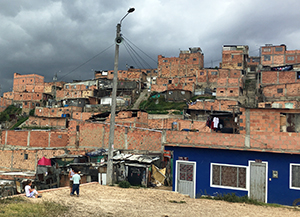Enabling Fiscal Capacity and Good Governance Through Urban Property Formalization
Researchers: Francisco Garfias (GPS) and Darin Christensen (UCLA)
Location: Colombia
 Economic theory suggests that secure property rights over land promote economic development and help governments enhance their fiscal capacity. Yet, despite the individual and societal benefits, most land in the developing world is not registered: in Colombia, over half of the land has not been formalized
Economic theory suggests that secure property rights over land promote economic development and help governments enhance their fiscal capacity. Yet, despite the individual and societal benefits, most land in the developing world is not registered: in Colombia, over half of the land has not been formalized
This research project asks why, providing experimental estimates of both households’ demand for formalization, as well as the effects of property formalization on government revenues and on households’ investment and welfare. We partner with a Colombian social enterprise to randomize formalization services, as well as randomly subsidize the formalization cost for households currently squatting on private land in Bogota.
We seek to quantify the costs and benefits associated with property formalization for both individuals, as well as local governments, which must decide how much to invest in the bureaucracy required to maintain a land registry and collect property taxes. We plan to implement a randomized experiment and collect data from 3,500 households, as well as administrative data from the municipal government.
Strides have been made alongside Innovations for Poverty Action (IPA) in Colombia, which is managing local research activities, to design the survey instruments and gain access to the required administrative data. The research team has also developed and piloted the baseline household survey. The team, along with IPA, led various focus groups with individuals living in neighborhoods adjacent to those that are part of the project. A survey instrument was then built using the feedback from the focus groups and previous questionnaires.

 Economic theory suggests that secure property rights over land promote economic development and help governments enhance their fiscal capacity. Yet, despite the individual and societal benefits, most land in the developing world is not registered: in Colombia, over half of the land has not been formalized
Economic theory suggests that secure property rights over land promote economic development and help governments enhance their fiscal capacity. Yet, despite the individual and societal benefits, most land in the developing world is not registered: in Colombia, over half of the land has not been formalized